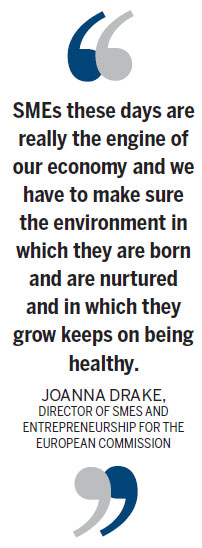China asked to think small
Updated: 2015-04-17 06:59
By Chen Yingqun(China Daily Europe)
|
|||||||||||
Everyone benefits when policies are friendly to smaller businesses, which are engines for innovation, European Commission official says
It would benefit both China and Europe for the Chinese government to pay more attention to the needs of small and medium-sized enterprises, an official of the European Union's executive body who visited Beijing last month says.
That means to "think small first" when considering the impact on such enterprises when developing a business policy, says Joanna Drake, director of SMEs and entrepreneurship for the European Commission.
|
Joanna Drake, director of SMEs and entrepreneurship for the European Commission, says China presents many opportunities for European companies to offer goods, services and access to global value chains. Zhang Wei / China Daily |
Drake was in Beijing to meet Chinese authorities, Ministry of Industry and Information Technology, for the EU-China SME Policy Dialogue.
Drake, who is from Malta, says the European Union policy is to incorporate "think small first" as part of its process to make the region's business environment friendlier.
She says that when new legislation on issues such as environment protection or health are proposed, many questions must be asked, including "What are the things that small companies can actually sustain? And what is too big for them to support?"
"So it means, what is the impact on business? We do this exercise within the European Union. It is part of the internal legislative procedure. We encourage the Chinese government to do the same, for the Chinese business environment to be healthier and also more welcoming for SMEs."
Small and medium-size enterprises are central to Europe's economy, accounting for about 99 percent of all enterprises and creating 85 percent of all the new jobs in the past five years. Europe has more than 20 million SMEs.
As Europe continues to feel the effects of an economic slowdown, many companies are looking for overseas opportunities, she says. So Europe needs to help companies with international potential take that step.
"The number of EU companies that are SMEs that actually engage in international activity is still too low. I think we need to increase it by any means possible," she says. "Many SMEs do not want to become international, but those that have the potential should be encouraged and helped to grow faster."

Despite predictions that China's GDP growth will slow to 7 percent this year, Drake says there is still growth.
"I think the size of the Chinese market itself, the pace of its growth and the diversification of this market in itself are very attractive factors for all EU companies that want to grow, that want to expand and that want to innovate."
China is the EU's second-largest trading partner, and the EU is China's largest trading partner.
Drake says that in the past two years, European Commission officials have visited Chengdu twice, in Southwest China, which shows that European SMEs are interested in exploring new business opportunities in the country.
China presents many opportunities for European companies to offer goods, services and access to global value chains, she says.
"We are looking at an era of economic growth where access to value chains is perhaps the most important source of growth.
"We are asked very frequently by the Chinese government which measures we are taking in practice and what sort of results we get. Hopefully in sharing our examples with Chinese authorities, we are also showing them how we would like the business environment in China to be for EU SMEs to be more attracted to the Chinese market and of course, vice versa."
Chi Renyong, professor at the Zhejiang University of Technology, says that in the past few years, SMEs have gained more recognition in China, and the government has promised to support the development of SMEs. Smaller foreign companies are also very welcome in China.
Chi says that in the process of China's transformation to a more consumption-driven economy, SMEs, which are usually very innovative and good job creators, will be a main force and a very dynamic part of the economy.
Drake says the European Union has developed important tools to help European SMEs work in China: the EU SME center in Beijing and the China IPR SME Helpdesk.
The EU SME center, established in 2011, provides free, hands-on support services to SMEs, including online seminar and an auto-diagnostic toolkit assessing readiness for the Chinese market. The center focuses on the crucial early stages of market penetration strategy.
Given that protection of intellectual property rights is frequently cited as a big concern, since 2008 the China IPR SME Helpdesk has played a pioneering role in supporting businesses in protecting and enforcing their rights.
Also, a new program called COSME, the EU program for the Competitiveness of Enterprises and Small and Medium-sized Enterprises, has been launched for 2014-20 to provide dedicated funding and services for SMEs. The program has a budget of 2.3 billion euros ($2.4 billion) over its seven-year lifetime, allocated in four main areas: better access to finance, improved access to markets, support for entrepreneurs establishing new businesses, and support for more favorable conditions.
The Enterprise Europe Network is also a key resource offering free support and advice for companies. The network has 600 partners in 54 countries, including China.
Drake says administrative burdens in China can be daunting for European SMEs, most of which have 10 people or fewer, especially because China is so big, with so many different jurisdictions. Reducing that burden helps all SMEs, she says.
She adds that access to finance is another big problem for SMEs, and Europe's financial crisis has made things more difficult.
"I would say in China the issue of finance not being available in general to companies needs to be looked at more closely. This is an issue that needs to be more and more highlighted to Chinese authorities, that there has to be a more open financing system."
"SMEs these days are really the engine of our economy, and we have to make sure the environment in which they are born, nurtured, and in which they grow keeps on being healthy. And this is what we also foresee in the Chinese market for all companies including European companies."
chenyingqun@chinadaily.com.cn
(China Daily European Weekly 04/17/2015 page8)
Today's Top News
AIIB to operate in 'transparent way'
PLA to buy advanced missiles from Russia
EU accuses Google of hurting consumers, competitors
Q1 economic data: what the economists say
Holocaust memories to live on
Problem-plagued Milan Expo battles a long list of headaches
Foreign ministers call for end to fighting in east Ukraine
Spotlight set to shine on royal sibling
Hot Topics
Lunar probe , China growth forecasts, Emission rules get tougher, China seen through 'colored lens', International board,
Editor's Picks

|

|

|

|

|

|







